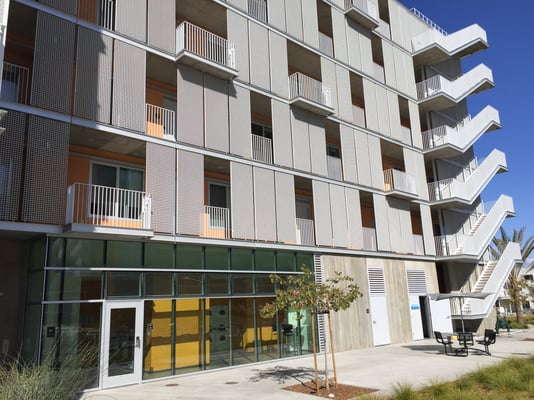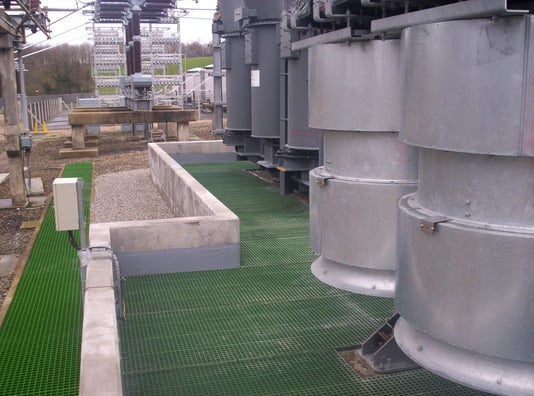Well-made plastic grating is a versatile material that finds its applications in myriad industries...
Exploring the Versatile Applications of Fiberglass Reinforced Plastic Grating
Well-made plastic grating is a versatile material that finds its applications in myriad industries and settings. Read on as we delve into how fiberglass reinforced plastic grating can be used across many industries and use cases.
|
PHOTO 1: Fibergrate fiberglass reinforced plastic grating in a power plant |
What is Fiberglass Reinforced Plastic Grating?
When we talk about plastic grating or fiberglass reinforced grating, we mean a structural material composed of synthetic polymers or plastics characterized by a grid-like pattern. Each product is made with different types of plastics and designed for different purposes.
In plastic grating production, there are essentially six different approaches, and each has slightly different properties:
-
Molded Fiberglass Reinforced Plastic (FRP) Grating is manufactured by combining plastic resin and glass fibers in different ratios to achieve different strength levels while being corrosion resistant.
-
Pultruded FRP Grating is created by pulling continuous glass fibers through a resin bath and then through a shaping die. It tends to offer excellent load-bearing capabilities.
-
Molded High-Density Polyethylene (HDPE) Grating is made from high-density polyethylene and is sometimes used in less demanding applications.
-
Pultruded Polypropylene (PP) Grating, similar to pultruded FRP grating, is made using polypropylene fibers and resin. It offers good chemical resistance and mechanical strength.
-
Vinyl Ester Grating can be used in the production of FRP grating, providing enhanced resistance to corrosion and chemicals.
-
Expanded Metal Grating, although not entirely plastic, can be coated with a plastic layer, such as PVC or polypropylene, to provide additional durability.
The Advantages of FRP Grating over Other Plastics and Materials
FRP grating often provides advantages over other plastic alternatives and traditional materials like steel, aluminum, and wood. These benefits include:
-
Exceptional durability, with a high strength-to-weight ratio that, depending on the specific material, can even carry vehicular loads while weighing less than steel
-
Corrosion resistance to reduce maintenance requirements
-
Resistance to chemicals for demanding industrial environments
-
Non-conductive properties, making it a safer choice than metal for electrical environments
Industrial Applications for Durable Plastic Grating
-
Industrial Flooring and Walkways or Catwalks
FRP grating plays a pivotal role in industrial settings, providing robust flooring and walkway solutions. There are even types of FRP grating that offer a slip-resistant surface and are manufactured to ensure longevity in harsh chemical environments. At CXY Chemicals in Domino, Texas, for example, Fibergrate FRP grating was installed for a spill containment area where chemicals are unloaded.
-
Drainage Systems
Efficient water flow and the prevention of slip hazards are paramount in industrial areas. Plastic grating excels in both aspects, offering excellent drainage while enhancing worker safety.
-
Staircases and Platforms
In industrial settings, staircases and platforms require high durability and strength. FRP grating delivers these attributes and, importantly, its non-conductive nature ensures electrical safety in hazardous environments.
Plastic Grating Use in Wet Commercial and Recreational Spaces
In these spaces, the requirements for safety and durability can be especially challenging to meet. Fiberglass reinforced plastic grating meets those challenges, offering solutions that ensure both safety and longevity in these environments.
- Pools, Spas, Decks, and Marina Docks
FRP grating products that provide a slip-resistant surface and exhibit remarkable resistance to water and chemicals are ideal for use around pools and marinas. For this rooftop pool deck at a Scottsdale, Arizona, apartment complex, fiberglass reinforced plastic grating provided the optimal corrosion resistant solution for supporting turf while ensuring proper drainage and safety for residents.
- Playgrounds and Water Parks
For children's safety, FRP grating can be a top choice in playgrounds and water parks. The durability of FRP ensures minimal maintenance requirements while choosing a product with a slip-resistant surface minimizes the risk of accidents.
- Fish Hatcheries
Fish hatcheries like the ones in Hoodsport, Washington, rely on fiberglass reinforced plastic grating due to its non-leaching properties which prevent the release of harmful materials into the water. It can also withstand the corrosive effects of salt water, making it indispensable in these environments.
Architectural and Construction Applications for Plastic Bar Grating
More than simply a workhorse material for walkways and drainage areas, fiberglass reinforced plastic grating can also contribute to the visual impact and energy efficiency of buildings. It offers a wide range of aesthetic options along with the benefits of being lightweight and easy to install. It serves as an excellent choice for facade and cladding solutions as well as in sunshade and screen applications, providing privacy and effective shelter from damaging UV rays. The material’s weather resistance ensures longevity even in challenging outdoor environments.
 PHOTO 2: Fibergrate fiberglass reinforced plastic grate products used as sunscreens in apartment complex PHOTO 2: Fibergrate fiberglass reinforced plastic grate products used as sunscreens in apartment complex |
As you can see, fiberglass reinforced plastic grating stands as a versatile and indispensable material in a wide array of applications. From its strength and durability to its chemical/corrosion resistance and non-conductive nature, it presents a preferred choice across various industries. Whether you need industrial solutions, require safety in wet environments, or seek architectural and construction applications, FRP grating can offer a versatile and dependable solution. Locate a Fibergrate sales representative in your area to learn more today.



